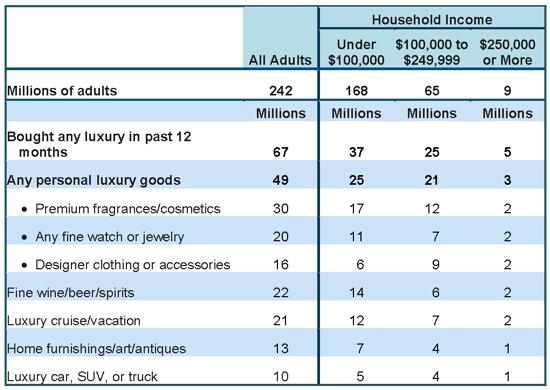Recently, a luxury marketer who tends to focus specifically on the affluent marketplace asked me if I knew how many adults with household incomes under $100,000 bought luxury products
and services. I then asked him why and he told me he felt that a fairly large number of consumers with household incomes under $100,000 buy luxuries.
I responded that my syndicated
survey does measure the mainstream marketplace (the under $100,000 household-income segment) as well as all the affluent marketplaces and that with my survey he could choose his household-income
threshold according to how his brand defined affluence. After reviewing the statistics he requested from me, he told me he was astounded my survey indicated that, of the 67 million adults who reported
they bought one or more luxuries in the past 12 months, 37 million (a majority of all luxury consumers) stated they had household incomes less than $100,000.
This marketer was
correct in thinking that a majority of luxury buyers are not measured by all syndicated surveys. I then told him that when I was the CEO of another syndicated survey, a number of luxury brands talked
with me about that survey’s not measuring what some luxury marketers called "mainstream" Americans — consumers who aspire to live a more luxurious life and from time to time buy a
lower-priced luxury product or service.
advertisement
advertisement
As the following exhibit from my current survey indicates, mainstream Americans do report they buy luxuries, especially personal luxury goods
— some 25 million mainstream consumers, about the same number of personal luxury goods purchasers included in the more affluent income segments measured by the other survey. As noted in the
exhibit below, "mainstreamers" are also very important buyers of other luxury categories—especially fine wine, beer, and spirits.
Past-12-Month Purchasers of Luxury
Categories in Millions

In only one category, designer clothing or accessories, were there more luxury buyers from the $100,000+
household-income segments (11 million, compared with 6 million with household incomes under $100,000). Notably, the same number of "mainstreamers" as affluent consumers reported they bought a luxury
vehicle (5 million).
In conclusion, if your organization markets a luxury brand, be aware that "mainstreamers" matter, depending on what your organization is marketing, its
positioning in its marketplace, and its starting price points. Also, if you are targeting Millennials, as most luxury brands are trying to do today, your organization needs to consider offering
entry-level luxury goods or services with more affordable prices, as the vast majority of Millennials not living with their parents are "mainstreamers."